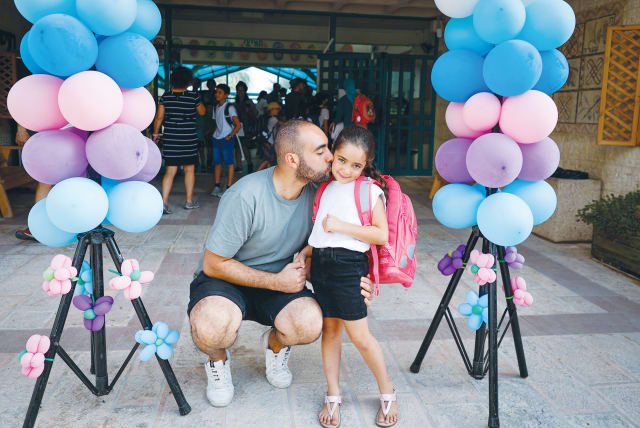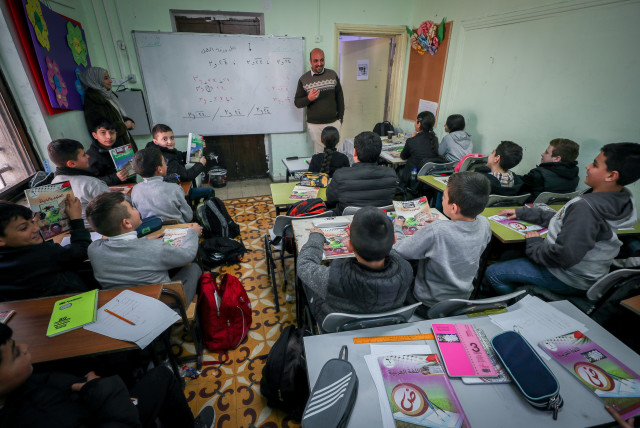Planning well in the present for a better future - opinion

The responsibility of an elected leadership is to be concerned about the next generations and the resilience of the state.
As someone who has been living in Israel for over two decades, I feel significantly concerned vis-à-vis its elementary and secondary schooling system. This concern is not motivated by a specific political stance, nor is it due to an overly critical nature. It has grown, over the years, while I follow my children’s education, simply from the point of view of a caring citizen and a worried parent.
I look with true concern at the children of Israel, and the fact that from a very early age they are confined to one of four main educational tracks, that almost never converge – the ultra-Orthodox educational track; the national-religious track; the secular-national track and the Arab track. That is, as if they were children growing up in four different countries and not in one sovereign state, in which the Education Ministry grants all children one set of educational tools and allows school principals to enrich and enhance the curriculum according to their experience and preferences within certain acceptable frameworks.
Children from different sects in the Israeli society mostly study in almost completely homogeneous and separate realms, owing to the insistence of their political representatives and the original understanding, upon the establishment of the State of Israel, that a significant degree of cultural and religious pluralism was needed.
Yet some seventy-five years later, what does this imply as per the possibility to allow for a greater degree of unity in society, particularly given the current divisions between Israelis? There are, indeed, points of congruence between different populations, but these are at best few and sporadic and do not provide the much-sought-after remedy to a growing chasm between the different sects within the greater Israeli society.
I am concerned as well about classrooms in Israeli schools being on average 21% more crowded than in other developed countries (according to the Education at a Glance study, done in 2019, for the OECD). In a classroom comprising 30 or more school children, one need not be a genius to understand that some of them will simply fall between the chairs. The emphasis in this case is naturally on those children who live in homes, in which parents are so concerned with daily issues that they are not free to provide their children the emotional support they need.
Schools are not a substitute for families and the set of values one is equipped with from home. After all, a child spends many hours in an educational institution and that, too, may have tremendous impact upon the child’s development. As in the words of Rabbi Shlomo Carlebach, “The only thing a child needs, is for one grown-up to believe in him.”
CROWDED CLASSROOMS aside, another aspect that has a detrimental affect on the passing of knowledge and values at schools, is the almost complete lack of discipline in Israeli schools.
Throughout the years, a growing culture of “lets make it fun for the child” has become the norm and has aggressively overridden concepts such as mutual respects for one’s peers, honoring one’s teachers and zero tolerance for violence, verbal or physical. A child growing up without clear behavioral boundaries will surely grow up into a disrespectful, aggressive and intolerant adult.
And then there is the anomaly pertaining to the salaries of our educators. Which sensible person will dedicate his or her life to the vastly important task of educating the generation of tomorrow without being able to tend to his own family’s basic needs? Furthermore, the lower the salary, the greater the perception is amid the public that the profession is not worthy of respect despite the fact that it is, de facto, the basis to the very future of this country.
After all, the greatest asset of all, which has made Israel the miracle that it currently is, is our human resource.
Throughout the years, many governmental negotiations have taken place between various Finance Ministries and the teachers’ syndicates, in order to examine the possibility of raising educators’ salaries. That is, while statistics point to the fact that Israeli teachers get 5-6% less than their colleagues in the OECD countries.
That, as well as the basic requirements for studying education in tertiary institutions here are insanely and inexplicably low. Further, a lack of sufficient strategic planning on the part of different governments vis-à-vis education created a reality in which there are insufficient high-level and suitable teachers in Israeli schools. It also allowed for those who are less equipped and/or suitable to enter the important world of education.
Government must find immediate solutions for the education system
Many thinkers have stressed the importance of education throughout the centuries. Janusz Korczak – the legendary teacher of orphans who during the Holocaust, refused to allow his “children” to enter the gas chambers unaccompanied lest they be afraid – said, “He who is concerned for the days to come, sews wheat; He who is concerned for the years to come, plants trees; and he who is concerned for the next generations, educates people.”
It appears to me that the responsibility of an elected leadership is to be concerned about the next generations and the resilience of the state. It means thinking of the means through which different sects in society can find points of contact in a systematic and integral manner within the macro educational system.
There must be immediate decisions taken on raising the salaries of all educators; and to make sure that stricter discipline is practiced in educational institutions in order to allow for more tolerance, patience, courtesy and decorum among pupils, which will perhaps not curb but certainly diminish violence, aggression and intolerance in society in general.
The writer, a former MK, was the founder and co-chair of the first Abraham Accords Caucus in the Knesset. She has been appointed the chairperson of the newly established Women’s Impact Forum of the World Jewish Congress.
Jerusalem Post Store
`; document.getElementById("linkPremium").innerHTML = cont; var divWithLink = document.getElementById("premium-link"); if (divWithLink !== null && divWithLink !== 'undefined') { divWithLink.style.border = "solid 1px #cb0f3e"; divWithLink.style.textAlign = "center"; divWithLink.style.marginBottom = "15px"; divWithLink.style.marginTop = "15px"; divWithLink.style.width = "100%"; divWithLink.style.backgroundColor = "#122952"; divWithLink.style.color = "#ffffff"; divWithLink.style.lineHeight = "1.5"; } } (function (v, i) { });

